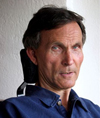Is Personal Assistance Relevant for Developing Countries?
s Personal Assistance Relevant for Developing Countries?

![]() See Curriculum Vitae.
See Curriculum Vitae.
In industrialized countries the Independent Living Movement works for personal assistance which for us is a key for independent living for persons with extensive disabilities. In these countries the majority of this group depends on the family for assistance. Without family members with time and energy for this work we have to move into institutions. In both solutions we cannot expect to live like other people. Few of us live in the community with community based services, which also are not a guarantee for a life with self-determination and dignity. Only a tiny minority of assistance users receive cash payments for personal assistance from the government.
If the situation is bad enough in developed countries, what is it in developing countries? How do people in those countries live who depend for their survival on other persons? We sometimes hear disabled people from developing countries or professionals working there saying that there is no problem, that there are always family members around happy to help, that the family is preferred over paid workers as a source of assistance, that the concept of paying cash for assistance services would be foreign to the culture in these countries.
Below I suggest a definition of Personal Assistance, a goal that most assistance users in developed countries would consider worth working for. But do assistance users in developing countries have the same goal?
I ask visitors to our Website who are assistance users in developing countries to, please, comment on the definition. Don’t forget to tell us where you live, whether your family belongs to the lower, middle or upper class in your local area, what your assistance needs are, and how you solve them, so our readers know what your situation is.
Personal Assistance: Definition and Goal
The international Independent Living Movement demands that disabled people need to enjoy the same degree of interdependence within the family that is common for non-disabled siblings, friends and neighbors. This applies particularly to persons with extensive disabilities who depend for their survival on the practical assistance of other persons for the activities of daily living, such as: getting dressed, going to the toilet, eating and communicating (in the case of non-verbal persons), and structuring the day (for persons with psychiatric disabilities).
The Independent Living Movement reserves the term “Personal Assistance" for this practical help, if and only if the individual assistance user has the power to decide who is to assist, with which activities, where, when and how.
According to the IL Movement, this degree of control is only possible,if individual users have the financial means to buy the services from service provider(s) of their choice and/or to employ persons of their choice (including family members) as assistants. It is recognized that people under age or persons with learning or psychiatric disabilities have the right to support in exercising the control. Since people with extensive disabilities or their families typically do not have the necessary economic resources, government payments are required.

